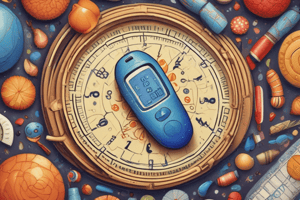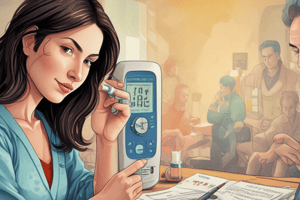Podcast
Questions and Answers
Which pharmacologic class is considered the first choice for patients with new and uncomplicated type 2 diabetes?
Which pharmacologic class is considered the first choice for patients with new and uncomplicated type 2 diabetes?
- Biguanides (correct)
- Alpha-glucosidase inhibitors
- Meglitinides
- Thiazolidinediones
What is a common adverse effect of insulin therapy?
What is a common adverse effect of insulin therapy?
- Nausea
- Hypoglycemia (correct)
- Weight gain
- Kidney damage
Which of the following is NOT a known cause of dysglycemia?
Which of the following is NOT a known cause of dysglycemia?
- Biguanides (correct)
- Beta-blockers
- Corticosteroids
- Thiazide diuretics
What is a primary mechanism of action for sodium-glucose cotransporter 2 (SGLT2) inhibitors like Canagliflozin?
What is a primary mechanism of action for sodium-glucose cotransporter 2 (SGLT2) inhibitors like Canagliflozin?
Which adverse effect is commonly associated with the use of thiazolidinediones?
Which adverse effect is commonly associated with the use of thiazolidinediones?
What is the primary mechanism of action of alpha-glucosidase inhibitors like acarbose?
What is the primary mechanism of action of alpha-glucosidase inhibitors like acarbose?
What is the effect of meglitinides like Repaglinide compared to sulfonylureas?
What is the effect of meglitinides like Repaglinide compared to sulfonylureas?
Which of the following therapies is associated with a risk of lactic acidosis?
Which of the following therapies is associated with a risk of lactic acidosis?
How do thiazolidinediones primarily affect glucose metabolism?
How do thiazolidinediones primarily affect glucose metabolism?
What is the effect of acarbose on HbA1c levels?
What is the effect of acarbose on HbA1c levels?
Which of the following statements about metformin is TRUE?
Which of the following statements about metformin is TRUE?
Which group of medications requires sufficient kidney function to maintain their antihyperglycemic effects?
Which group of medications requires sufficient kidney function to maintain their antihyperglycemic effects?
How do rapid onset insulin preparations function in diabetes management?
How do rapid onset insulin preparations function in diabetes management?
Which of the following is a unique risk associated with SGLT2 inhibitors?
Which of the following is a unique risk associated with SGLT2 inhibitors?
What cardiovascular effect have SGLT2 inhibitors been shown to provide?
What cardiovascular effect have SGLT2 inhibitors been shown to provide?
Which side effect is commonly caused by alpha-glucosidase inhibitors?
Which side effect is commonly caused by alpha-glucosidase inhibitors?
What caution is associated with the use of loop diuretics alongside specific diabetes medications?
What caution is associated with the use of loop diuretics alongside specific diabetes medications?
What is a significant benefit of nonpharmacologic interventions in diabetes management?
What is a significant benefit of nonpharmacologic interventions in diabetes management?
Which of the following statements about dipeptidyl peptidase-4 inhibitors is true?
Which of the following statements about dipeptidyl peptidase-4 inhibitors is true?
What is a potential adverse effect associated with glucagon-like peptide-1 receptor agonists?
What is a potential adverse effect associated with glucagon-like peptide-1 receptor agonists?
In what way do sulfonylureas primarily function?
In what way do sulfonylureas primarily function?
What is a characteristic effect of glucagon-like peptide-1 receptor agonists on body weight?
What is a characteristic effect of glucagon-like peptide-1 receptor agonists on body weight?
Which of the following is true regarding the safety profile of sitagliptin?
Which of the following is true regarding the safety profile of sitagliptin?
Which condition is a contraindication for the use of glucagon-like peptide-1 receptor agonists?
Which condition is a contraindication for the use of glucagon-like peptide-1 receptor agonists?
What is the typical effect on HbA1c observed with most sulfonylureas?
What is the typical effect on HbA1c observed with most sulfonylureas?
What is the primary mechanism of action for dipeptidyl peptidase-4 inhibitors?
What is the primary mechanism of action for dipeptidyl peptidase-4 inhibitors?
Flashcards are hidden until you start studying
Study Notes
Introduction
- Focus is on type 2 diabetes (T2D)
- Key element: insulin resistance leading to insulin deficiency and hyperglycemia
Drugs causing dysglycemia
- Beta-blockers (drugs ending in –olol)
- Corticosteroids (prednisone)
- HMG-CoA Reductase Inhibitors (drugs ending in statin)
- Thiazide or loop diuretics (hydrochlorothiazide, furosemide)
- Protease antiviral medications
- Second-generation antipsychotics (olanzapine, quetiapine)
Goals of therapy
- Control symptoms
- Maintain glycemic control
- Prevent complications
- Manage risk factors (hypertension, obesity, dyslipidemia)
Pharmacologic choices
- Nonpharmacologic interventions (diet, exercise) are essential
- Self-monitoring is important
Insulin
- Human insulin and insulin analogues are preferred
- Classified by onset and duration of action
- Rapid-acting for postprandial injections or insulin pump use
- Long-acting for basal infusion
Insulin adverse effects
- Hypoglycemia is the most common
- Localized fat hypertrophy
- Allergic reactions
Biguanides
- Metformin is generally the first choice for new and uncomplicated T2D
- Decreases hepatic glucose production
- Does not cause weight gain
- Lowers HbA1c by 1-1.5%
Biguanides adverse effects
- Gastrointestinal side effects (nausea, diarrhea, discomfort)
- Lactic acidosis risk in those with hepatic/renal disease
- Vitamin B12 deficiency with long-term use
- Low risk of hypoglycemia as monotherapy
Alpha-glucosidase inhibitors
- Acarbose inhibits intestinal alpha-glucosidases
- Delays starch and disaccharide digestion, reducing postprandial glucose
- Does not significantly affect lactase
Acarbose
- Requires TID dosing
- Effective only with meals
- Lowers HbA1c by 1% or less
- Glucose, not sucrose, should be used for hypoglycemia treatment
- Does not cause weight gain
Acarbose adverse effects
- Gastrointestinal side effects (flatulence, diarrhea, pain, cramps)
- May reduce metformin bioavailability
- Contraindicated in irritable bowel disorders
Dipeptidyl Peptidase-4 Inhibitors
- Generic ending: -gliptin
- Sitagliptin is an example
- Inhibit enzyme responsible for GLP-1 degradation
- Indirectly act as incretin mimetics
Dipeptidyl Peptidase-4 Inhibitors
- Do not seem to alter cardiovascular risk
- Lower HbA1c by 1% or less
- Weight neutral
Dipeptidyl Peptidase-4 Inhibitors adverse effects
- Nasopharyngitis, hypersensitivity reactions
- Rare pancreatitis and joint pain
- Low interaction potential due to minimal cytochrome P450 inhibition
- Low risk of hypoglycemia
Glucagon-like Peptide-1 Receptor Agonists
- Semaglutide and liraglutide are examples
- Direct incretin mimetics by acting on GLP-1 receptors
- Increase insulin secretion, suppress glucagon, slow gastric emptying, increase satiety
Glucagon-like Peptide-1 Receptor Agonists
- Usually subcutaneous injection, but oral semaglutide exists
- Decrease HbA1c by 1-1.5%
- Cause weight loss
- Evidence suggests cardiovascular event prevention in both primary and secondary prevention
Glucagon-like Peptide-1 Receptor Agonists adverse effects
- Common GI side effects, especially nausea initially
- Injection site reactions
- Rare pancreatitis
- Caution in heart rhythm disturbances and severe renal impairment
- Contraindicated in pregnancy and those with medullary thyroid carcinoma or MEN type 2
Sulfonylureas
- Glyburide is an example
- Generic names often begin with gly or gli
- Insulin secretagogues, stimulating both basal and meal-stimulated insulin release
- Generally add-on therapy to metformin, not monotherapy
Sulfonylureas
- Lower HbA1c by 1-1.5%
- Variation within the class regarding effectiveness, hypoglycemia risk, and weight gain
- Glyburide has higher hypoglycemia and weight gain risks
- Cardiovascular event reduction unclear due to lack of evidence
Sulfonylureas adverse effects
- Weight gain
- Prolonged hypoglycemia, especially in elderly or those with renal impairment
- Beta-blockers can mask hypoglycemic symptoms
Meglitinides
- Repaglinide is an example
- Another class of insulin secretagogues
- Shorter duration of action than sulfonylureas
- Similar effects and adverse effects as sulfonylureas
- Lower hypoglycemia risk if meals are missed
- More extensive metabolic drug interactions
Sodium-Glucose Cotransporter 2 Inhibitors
- Canagliflozin is an example
- Prevent glucose reabsorption in the kidneys, leading to enhanced excretion
- Do not cause weight gain (cause weight loss)
- Lower HbA1c by 1% or less
Sodium-Glucose Cotransporter 2 Inhibitors
- Reduce cardiovascular mortality, adverse cardiovascular events, and hospitalization due to heart failure
- Small blood pressure decrease
- Require sufficient kidney function
- Slow progression of nephropathy
Sodium-Glucose Cotransporter 2 Inhibitors adverse effects
- Increased risk of urinary tract infections
- Hypotension due to reduced intravascular volume
- Hyperkalemia
- Diabetic ketoacidosis risk
- Increased hypotension risk when used with loop diuretics
Thiazolidinediones
- Pioglitazone is an example
- Agonists at PPARG receptors in the nucleus (particularly in adipose tissue)
- Influence gene expression, upregulating GLUT4 transporters and lipoprotein lipase
- Enhance glucose reabsorption and triglyceride hydrolysis
- Exact mechanism not fully understood
Thiazolidinediones
- Increase peripheral glucose uptake
- Enhance fat cell insulin sensitivity
- Decrease hepatic glucose output
- Reduce HbA1c by 1-1.5%
- Associated with weight gain
Thiazolidinediones adverse effects
- Increased heart failure risk due to fluid retention and edema
- Fractures (hip and wrist)
- Worsened macular edema
- Health Canada mandates patient counseling and written consent for rosiglitazone
Sample question
- Metformin is generally considered first-line therapy for most patients with type 2 diabetes.
Studying That Suits You
Use AI to generate personalized quizzes and flashcards to suit your learning preferences.




